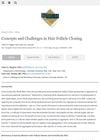2 citations,
August 2022 in “Viruses” Skin cancer often starts from Lgr5+ progenitor cells.
2 citations,
April 2022 in “Genes” The study found that the hair loss condition in Cesky Fousek dogs is influenced by multiple genes affecting skin and muscle structure, fat metabolism, and immunity.
2 citations,
April 2023 in “PubMed” Improving maternal diets can prevent severe health issues, including death, from goiter in goat kids.
 1 citations,
September 2023 in “Molecules (Basel. Online)”
1 citations,
September 2023 in “Molecules (Basel. Online)” Plant sterols have health benefits like lowering cholesterol, but more research is needed to understand their effects and improve their extraction and sustainability.
 1 citations,
August 2023 in “Military Medical Research”
1 citations,
August 2023 in “Military Medical Research” Smart hydrogel dressings could improve diabetic wound healing by adjusting to wound conditions and controlling drug release.
1 citations,
April 2022 in “JAAD case reports” A woman developed a rare scalp condition after starting minoxidil, which was resolved with specific shampoo and solution.
 1 citations,
September 2021 in “Physiology News”
1 citations,
September 2021 in “Physiology News” Understanding how different body systems interact can improve how we prevent or treat frailty in aging.
 1 citations,
February 2017 in “MOJ bioequivalence & bioavailability”
1 citations,
February 2017 in “MOJ bioequivalence & bioavailability” Treating hair loss effectively may require a multi-sided approach, using different treatments together, and topical treatments could be more effective and safer than oral ones.
 November 2024 in “Stem Cell Research & Therapy”
November 2024 in “Stem Cell Research & Therapy” Stem cells from umbilical cords can help regrow hair in mice with hair loss.
 October 2024 in “Journal of Plant Growth Regulation”
October 2024 in “Journal of Plant Growth Regulation” Fusarium sp. strain K-23 helps Arabidopsis plants grow better in salty soil by promoting root hair growth.
August 2024 in “Journal of Photochemistry and Photobiology B Biology” Combining light therapy with certain substances improves hair growth in people with hair loss.
 July 2024 in “Indian Journal of Dermatology Venereology and Leprology”
July 2024 in “Indian Journal of Dermatology Venereology and Leprology” Certain gene variations in PITX2 are linked to a higher risk of male pattern baldness in Indians.
March 2024 in “Antioxidants” Excessive blue light harms eye cells and disrupts sleep patterns.
February 2024 in “Epigenomes” Epigenetic mechanisms control skin development by regulating gene expression.
 October 2023 in “Cell & bioscience”
October 2023 in “Cell & bioscience” A special gene region controls the re-emergence of a primitive wool type in Merino sheep, improving their wool yield and adaptability.
 August 2023 in “Bioengineering”
August 2023 in “Bioengineering” Bioprinting could greatly improve health outcomes but faces challenges like material choice and ensuring long-term survival of printed tissues.
 July 2023 in “Stem Cells Translational Medicine”
July 2023 in “Stem Cells Translational Medicine” Mesenchymal Stem/Stromal Cells (MSCs) help in wound healing and tissue regeneration, but can also contribute to tumor growth. They show promise in treating chronic wounds and certain burns, but their full healing mechanisms and potential challenges need further exploration.
CCC1 is essential for ion balance and proper plant cell function.
CCC1 is crucial for pH balance in plant cells, affecting growth and stress tolerance.
Different types of sun exposure damage skin cells and immune cells, with chronic exposure leading to more severe and lasting damage.
 April 2021 in “IntechOpen eBooks”
April 2021 in “IntechOpen eBooks” Androgens, male hormones, affect physical and mental functions, with a decrease leading to health issues like muscle loss, bone disease, and depression, and more research is needed on long-term effects and treatments.
November 2020 in “IntechOpen eBooks” Not getting enough minerals can lead to health problems and shorter lifespans.
June 2020 in “Journal of Investigative Dermatology” The symposium highlighted the importance of genetics in understanding and treating complex skin diseases.
 January 2014 in “Hair transplant forum international”
January 2014 in “Hair transplant forum international” Hair follicle cloning is possible but faces many challenges before it can replace traditional hair transplants.
 September 2023 in “Cureus”
September 2023 in “Cureus” Topical finasteride might be a good alternative for hair loss treatment with fewer side effects, but more research is needed.

The document concludes that understanding hair's composition and the effects of treatments can lead to better hair care products.
 January 2022 in “Clinical Cases in Dermatology”
January 2022 in “Clinical Cases in Dermatology” A condition called Central Centrifugal Cicatricial Alopecia causes hair loss and scalp burning in middle-aged African women, and it's treated with various medications, hair transplants, and non-drug methods like wigs.
 9 citations,
February 2022 in “Biomolecules”
9 citations,
February 2022 in “Biomolecules” Drinking a lot of alcohol increases the risk of prostate cancer and can worsen the condition.
 2 citations,
August 2023 in “Life”
2 citations,
August 2023 in “Life” Bioinspired polymers are promising for advanced medical treatments and tissue repair.
 2 citations,
June 2023 in “Pharmaceutics”
2 citations,
June 2023 in “Pharmaceutics” Nanofiber scaffolds help wounds heal by delivering drugs directly to the injury site.

















